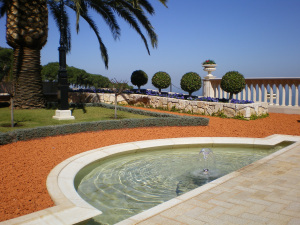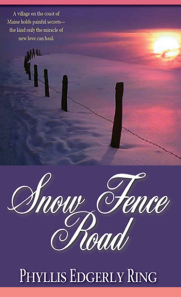Phyllis Edgerly Ring's Blog, page 43
March 5, 2014
Taking refuge in the Divine
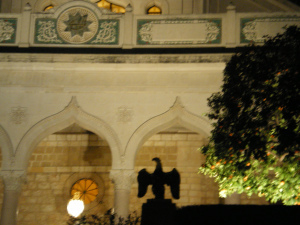 Gleanings found here and there:
Gleanings found here and there:
Man is My mystery, and I am his mystery.
~ Bahá’u’lláh
We can trust that there is a knowing that is out of the realm of thoughts or emotions or circumstances. When we deeply trust, our minds open to discover what is true, regardless of what we are feeling. ~ Gangaji 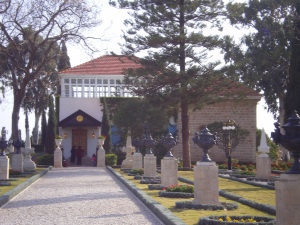
The single most important thing we can do is stop and get off the train of our own obsessive convictions and move into awareness of some sort of presence or the present time … and breathe again. That’s about as prayerful as life gets. That is about as faithful and spiritual as I mean. And everyone can relate to that. ~ Anne Lamott
Let go of what you are not and be who you truly are. When you let go, you create space to receive more. ~ John Whiteman
In life’s daily whirl, a call to centering — and real sustenance — wafts to me from reflections like these. As a Baha’i entering a season of fasting from the dominance and clamor of the material world, words from Michael Singer’s The Untethered Soul are also helpful: “… identify as the observer, not the experience; don’t let painful experience influence the present; you are not the thoughts you observe; a life of joy and love follows from a commitment made to a life of joy and love. Learn to live from your heart, not your ego. Take refuge in the Divine, not the temporary. Learn to control your mind rather than letting it control you. It’s just a mass of thoughts. It is possible never to ‘have’ a problem again.”
The journey that matters most to me requires that I review the events in my life for the wisdom and purpose they carry. This inventory brings questions like: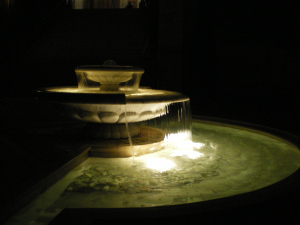
~ What are my true needs, and what is my inner “enough”?
~ How do I remember that strength, and every resource I require, arrives increment by increment, as I am ready?
~ How do I remember that inspiration and assistance will arrive, but need me to ask for them, acknowledge that I need them, and be willing to receive and act upon them?


March 2, 2014
The prayer that woke my heart
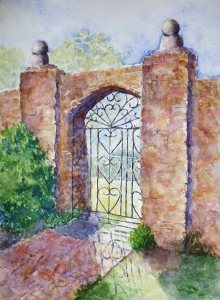
“Sissinghurst Gateway”, Laura Moore Watercolours
When I awoke with a prayer running through my head like a song, I knew that the door was already wide open to happiness.
Instead of finding myself awash in thoughts already run rampant — or consciousness dragging to life like sluggish motor oil, here was this mild, steady, comforting rhythm already oscillating inside me. All-embracing, and transporting.
This affected me so deeply that when it came time to read the prayers I customarily say with my husband each morning, the mere sight of words like “the All-Merciful, the Ever-Forgiving” and “the ocean of Thy nearness” overwhelmed me, like immersion in an ocean of light.
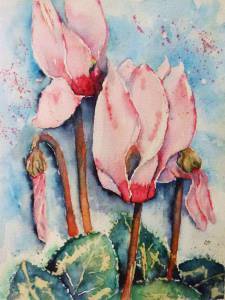
“Cyclamen”, Laura Moore Watercolours
I am embarking upon what Baha’is sometimes call the “Season of Restraint.” This is a period at the close of our calendar year when, for 19 days, we are asked to undergo a material fast from food and drink during daylight hours as “an outer token of the spiritual fast … the withholding of oneself from all appetites of the self, taking on the characteristics of the spirit, being carried away by the breathings of heaven and catching fire from the love of God.”

“Veronese Window”, Laura Moore Watercolours.
Fasting from the appetites of the body reminds me how insistent these appetites can be; how unsatisfied, and unsatisfying.
And how much time the business of survival can consume in my day, and my awareness — especially when it’s overemphasized by the culture around me to the point at which I might begin to forget that I have a spiritual life at all.
Fasting reminds me that there is an entirely other possibility waiting in my living that’s like a portal to a wider, kinder refuge. One in which I am visited and accompanied by a grace like the prayer that woke my heart.
My special thanks to artist Laura Moore for the wonderful watercolour images here. See more of her work at: http://www.lauramoorewatercolourart.com/


February 26, 2014
My first teacher is still 21
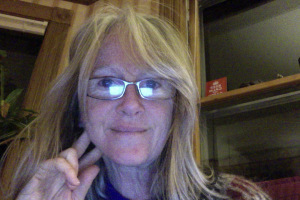 My mother didn’t have a “real” birthday except during leap years, which means that even when her death certificate recorded her age as 80, she was still technically only 21.
My mother didn’t have a “real” birthday except during leap years, which means that even when her death certificate recorded her age as 80, she was still technically only 21.
Mothers truly are our first teachers, which may explain why we can feel so inexplicably alone once they’re gone. With each passing year, so much of what I value can be traced back to my mother, a military spouse whose life didn’t turn out anything like her 21-year-old self imagined it would.
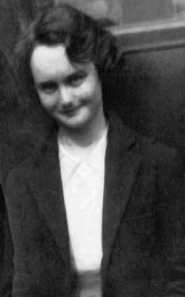 During the years that the war ravaged Europe, my young British war-bride mother held down the fort in her family’s home in England’s remote north. She cared for my newborn older sister, along with an elderly relative who was in the end stage of cancer, plus several children who’d been evacuated from London. Somehow, she also found time to hook rugs in order to generate income to compensate for the meager wartime rations on which her crowded household had to subsist. She had compassion for those young evacuees, both because they’d had to leave their families, and because she knew the life they’d face back home. Her own face already wore nasty scars from her service as a fire warden during the infamous “Blitzkrieg.”
During the years that the war ravaged Europe, my young British war-bride mother held down the fort in her family’s home in England’s remote north. She cared for my newborn older sister, along with an elderly relative who was in the end stage of cancer, plus several children who’d been evacuated from London. Somehow, she also found time to hook rugs in order to generate income to compensate for the meager wartime rations on which her crowded household had to subsist. She had compassion for those young evacuees, both because they’d had to leave their families, and because she knew the life they’d face back home. Her own face already wore nasty scars from her service as a fire warden during the infamous “Blitzkrieg.”
If anyone modeled for me how to welcome change gracefully, it was this woman who came to a new culture to meet her Boston-Irish in-laws, then proceeded to make a home for her family—over and over—in locations all over the world, wherever her husband’s military orders took us next. Her dedicated “nesting” efforts gave every place we lived that consistent feeling of home, however often we were uprooted and forced to start over.
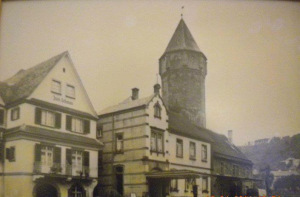 Life in a military family meant I had to keep making new friends and my mother, as with most everything, encouraged me in this and did her best to turn it into an adventure. She made it easy to nurture friendships by always welcoming playmates at our house and charming them with her warmth. (They usually loved her accent, too.)
Life in a military family meant I had to keep making new friends and my mother, as with most everything, encouraged me in this and did her best to turn it into an adventure. She made it easy to nurture friendships by always welcoming playmates at our house and charming them with her warmth. (They usually loved her accent, too.)
Because she was such a canny yet unobtrusive ally in assisting our friendships, my sister and I now find it easy to make friends wherever we go, to be the one to go talk to someone standing alone at a party, as we often saw her do. With her lively mind, she always had friendly, interesting questions that would gently coax people into the nicest conversations, even if she had to ask them in a language she was struggling to learn.
Long before the days of what would come to be called Women’s Lib, military spouses were already demonstrating versatility and capability, offering strong models for their children. Their spouse’s presence was often shadowy and intermittent, which tended to make these wives adaptable and decisive, and give their children resilience, as well. That’s very likely why I wound up marrying the son of such a mother.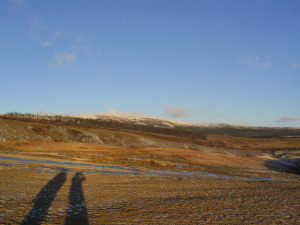
Among her many gifts, my mother was able to listen in a way that made you feel as though listening to you at that moment was the most important thing in the world, the only thing in her world. She also taught me how to value and use my own time—not just to be efficient and accomplish things, but also savor and enjoy something worth enjoying.
“A father and mother endure the greatest troubles and hardships for their children; and often when the children have reached the age of maturity, the parents pass on to the other world. Rarely does it happen that a father and mother in this world see the reward of the care and trouble they have undergone for their children,” the Bahá’í writings acknowledge. “Therefore, children, in return for this care and trouble, must show forth charity and beneficence, and must implore pardon and forgiveness for their parents.”
After my mother’s death, the one thing I heard most consistently from the many who loved her was how much kindness and help she had always shown them. It’s very clear, therefore, how I can best honor her memory. Her kindness and generosity are the most important lessons my first teacher ever gave me.
So, thanks for everything, Mum. You’ll always be twenty-one, to me.
Adapted from Life at First Sight: Finding the Divine in the Details:


February 23, 2014
The real universal language
A kindly tongue is the lodestone of the hearts of men.
It is the bread of the spirit, it clotheth the words with meaning,
it is the fountain of the light of wisdom and
understanding. ~ Bahá’u’lláh
When I saw the Chinese New Year decorations in a favorite restaurant this week, I was transported back to one of the most powerful lessons I ever received, from one of my youngest teachers. During the semester that I taught English to kindergartners in China, the curriculum I used also introduced another more universal language that I believe all human beings are pre-programmed to speak: the language of virtues.
 When you live in a place where you can’t speak the language, you gain new appreciation for spiritual attributes as stepping stones for communication. Kind looks and encouraging smiles are something we can all recognize and such gems of human goodness became more visible when we can’t fall back on words alone.
When you live in a place where you can’t speak the language, you gain new appreciation for spiritual attributes as stepping stones for communication. Kind looks and encouraging smiles are something we can all recognize and such gems of human goodness became more visible when we can’t fall back on words alone.
This happened for me one day in China when, right before the five classes I was scheduled to teach, I was hit by sudden illness that left me weak and dizzy in the midst of Shanghai’s spinning streets, on the verge of collapsing. I arrived at the school with no idea how I’d get through the afternoon of classes ahead of me.
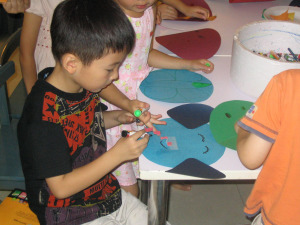 I was greeted at the classroom door by a five-year-old who, upon seeing me, took my bags and carried them to a place where he pointed for me to sit. Then he disappeared into the next room and returned with water in a beautiful clay teacup. He presented this to me with marked kindness, good manners, and concern, then stood beside me companionably, patting my back gently a few times as I sipped slowly.
I was greeted at the classroom door by a five-year-old who, upon seeing me, took my bags and carried them to a place where he pointed for me to sit. Then he disappeared into the next room and returned with water in a beautiful clay teacup. He presented this to me with marked kindness, good manners, and concern, then stood beside me companionably, patting my back gently a few times as I sipped slowly.
He spoke only a few English words he’d learned from me (none of which applied very much in this situation) and I spoke virtually no Chinese, but the unspoken communication between us in those moments was unmistakably deep. Settled in the hospitable embrace in which he immersed me with such unspoken wisdom, I felt my symptoms lifting off of me as I basked in the oasis of calm he had created. Then I experienced a surge of energy that lifted and carried me through that class and those that followed.
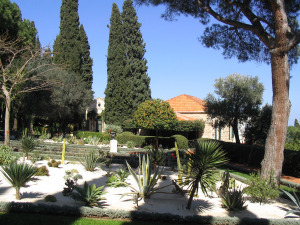 Remarkably, I can feel that same warm, healing strength today as I remember his kindness.
Remarkably, I can feel that same warm, healing strength today as I remember his kindness.
More than ever, humanity needs a universal language. Though I don’t know what it will be, I feel as though I’ve caught a glimpse of what must surely be one of its essential ingredients: the vocabulary of virtues that God has treasured inside each of us.
It seems to find its best expression in actions and gestures of kindness, and needs no translation at all.
Adapted from Life at First Sight: Finding the Divine in the Details:


February 19, 2014
Spiritual intelligence and divine design
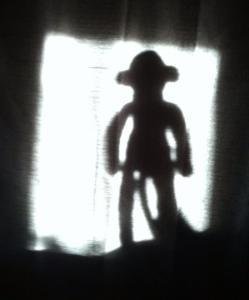
Photo: Nelson Ashberger
“Collective spiritual intelligence (SQ) is low in modern society,” physicist and philosopher Danah Zohar has said. “We live in a spiritually dumb culture characterized by materialism, expediency, narrow self-centredness, lack of meaning and dearth of commitment.”
However discouraging that assessment may sound, she goes on to describe how, as individuals “we can act to raise our personal SQ – indeed, the further evolution of society depends upon enough individuals doing so …”
Among the ways she describes that we can light up that darkness are to use our inner gifts:
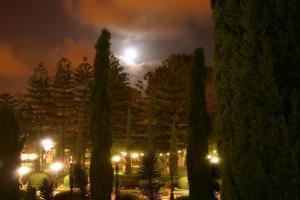
Photo: Nelson Ashberger
- “to look for the connections between things;
- to bring to the surface the assumptions we have been making about the meaning behind and within things;
- to become more reflective;
- to reach beyond ourselves a little;
- to take responsibility;
- to become more self-aware; and
- to be more honest with ourselves and more courageous.”
“Happy are those who spend their days in gaining knowledge, in discovering the secrets of nature, and in penetrating the subtleties of pure truth,” ‘Abdu’l-Bahá has reminded in a book called Some Answered Questions.
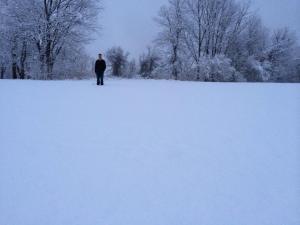
Photo: Saffron Moser
SO! The means of raising our SQ — and assuring the further evolution of society — is also – the source of happiness!
Each day presents us with a blank new canvas on which to place our steps toward this.
The world may seem a mess, but divine design remains both wondrous and unlimited, when we turn toward it and receive it with willingness.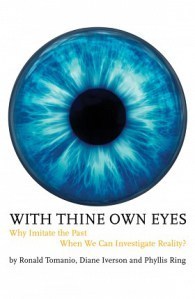
Explore more about the spiritual invitation of our times in With Thine Own Eyes: Why Imitate the Past, When We Can Investigate Reality? at:
Also available in print version from the publisher at: http://grbooks.com/george-ronald-publisher-books/spirituality/with-thine-own-eyes-1380638499


February 17, 2014
Our daily Brötchen
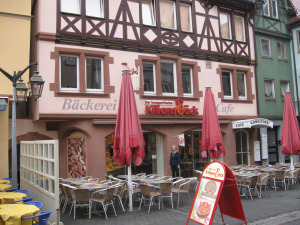 When life sends you sleeplessness – or any other waiting game — you can churn in frustration, or create an adventure you’d never otherwise know.
When life sends you sleeplessness – or any other waiting game — you can churn in frustration, or create an adventure you’d never otherwise know.
That’s what my husband and I did when we last visited Wertheim, my German hometown. At 4:30 on our first jet-lagged morning, rather than continue to toss and turn, we decided to go out for a very early-morning walk around town. The public-works employee we kept encountering as he emptied trash dispensers around this tiny heim only looked surprised the first time, then was friendly each time we met up with him under streetlamps and moonlight.
When an irresistible aroma wafted our way, we followed it to where a column of fragrant, bread-scented steam was rising in the dark in a little alleyway beside a bakery’s kitchen. We stood inside that steamy column and inhaled deeply, as if eating.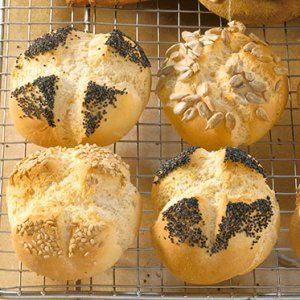
In a flash, we had our plan: as we walked around, we’d check the opening times for the bakeries in town and conduct a sort of taste test of Brötchen – those rolls of our childhood like mini loaves of crusty bread with exquisitely soft doughy centers. We’d begin with the bakery that opened the earliest, which turned out to be the one that had been sending out those lovely smells. It was also the hands-down winner – and, it turns out, is right around the corner from an apartment with which we would later begin to fall in love.
The runner-up of the four we sampled was a bakery in the market square that my mother shopped at 50 years ago, owned by the same family for 13 generations. A woman is now its master baker, something highly unusual in Germany when she took the helm there 20 years ago.
As the first train of the day rolled into town, the bridge across the river where we waited at the crossing gate had the sun coming up on one side and the moon setting on the other. It was a little slice of unexpected heaven as we sipped our coffee and nibbled the last of our buttery rolls.
All along one of the bridge’s railings was a sudden gallery exhibit: dozens of intricate spider webs illuminated in the morning sun, dewdrops glittering in them like crystals. It brought to mind those words of Kafka’s: “The world will freely offer itself to you to be unmasked, it has no choice, it will roll in ecstasy at your feet.”
Of course, preceding those words, he asserts, “You do not need to leave your room” … but only sit solitary and listening. In our adventure, of course, we had to accept what we could not change and then go out and see what we could do with it. Or what it would do with us.
But we had to be in motion for any of it to happen.
Yes, I am homesick for this town, and Germany, even more than I am for such good Brötchen. I’ve been making plans and booking reservations for our next trip this spring, and spending many hours in Germany again both in my writing and research.

Enter to win these vintage-design earrings from NH artist Diane Kirkup. Email: info@phyllisring.com with “vintage” in the subject line and your reply to the question: “What, as a reader, would you want to know about Eva Braun?” Contest ends Feb. 28.
Please check out the information here to the right, in case you’d like to give me input as I see how close I come to bringing another book home this year.
Some of you have already sent truly insightful ideas and questions, and I’m very grateful for them.


February 14, 2014
The climates we create
Gleanings found here and there:
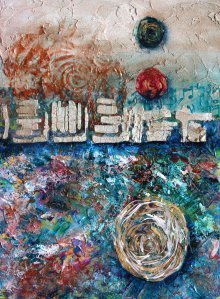
“The Master’s Path” by Judy Wright
I have come to the frightening conclusion that I am the decisive element. It is my personal approach that creates the climate. It is my daily mood that makes the weather. I possess tremendous power to make life miserable or joyous. I can be a tool of torture or an instrument of inspiration; I can humiliate or humor, hurt or heal. In all situations, it is my response that decides whether a crisis is escalated or de-escalated, and a person humanized or de-humanized. If we treat people as they are, we make them worse. If we treat people as they ought to be, we help them become what they are capable of becoming. ~ Johann Wolfgang von Goethe
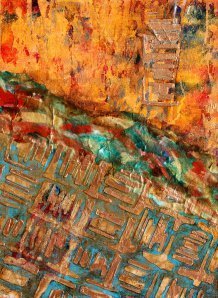
“Urban Renewal” by Judy Wright.
I cannot rid the entire world of noxious problems, but I can patiently cultivate the good earth around my own two feet and grow what I wish to see in my own back yard. ~ Jacob Nordby
Although the Realm of Glory hath none of the vanities of the world, yet within the treasury of trust and resignation We have bequeathed to Our heirs an excellent and priceless Heritage. Earthly treasures We have not bequeathed, nor have We added such cares as they entail. By God! In earthly riches fear is hidden and peril is concealed. … Fleeting are the riches of the world; all that perisheth and changeth is not, and hath never been, worthy of attention, except to a recognized measure. ~ Bahá’u’lláh


February 11, 2014
In the season of snow
Thanks so much, Christine Singleton, for that review at Goodreads, and for sharing your kind thoughts about Snow Fence Road on Facebook, too.
Christine Singleton‘s review
Feb 02, 14
5 of 5 stars – A friend recommended Snow Fence Road, and I picked it up on a whim. The cover is lovely ~ with a picture of a snowy road that just begs you to enter. Both of the main characters are dealing with losses, and every character in the book is so detailed that you feel you KNOW these people. It’s the kind of story you hate to have end. It’s based in New England and I wish that Tess was a friend of mine. I hope that Phyllis Ring considers a follow up to this book!
A total of 1,060 readers entered January’s Goodreads giveaway for the book, and one of those 3 winning copies is on its way to Australia. Do check out the giveaway offered here throughout February, too, (information below right).
And if you’ve read Snow Fence Road, I love hearing from you. It’s fun to see a little town in Maine, and four imaginary souls, find new friends in such far-flung places.

Enter to win these vintage-design earrings from NH artist Diane Kirkup. Email: info@phyllisring.com with “vintage” in the subject line and your reply to the question: “What, as a reader, would you want to know about Eva Braun?” Contest ends Feb. 28.
Snow Fence Road - A village on the coast of Maine holds painful secrets – the kind only the miracle of new love can heal.
More about the book at: http://www.amazon.com/gp/product/B00DDVB106/ref=as_li_ss_tl?ie=UTF8&camp=1789&creative=390957&creativeASIN=B00DDVB106&linkCode=as2&tag=leaofthetre-20″>Snow Fence Road<


February 8, 2014
The circle that includes us all
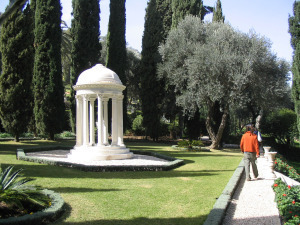
Photo: Tim Jette
Six years ago, my husband, Jon, our two grown kids, and our new son-in-law were on our way to Haifa, Israel, to share a Baha’i pilgrimage. Nineteen years earlier, Jon and I had visited this same spot and I’d prayed that, if it were truly in the best interest of all involved, we might return one day as a family. And so, here we were, living into a heart’s prayer answered; a dream realized.

Photo: Tim Jette
In the golden evening glow of the Bab’s shrine, the reality of the larger spiritual reunion I am part of came home to me in a sweetly unexpected way. It was close to sunset on the eve of the Jewish Sabbath, when many in Haifa close their shops or leave work early to prepare for this day kept sacred. A mood of impending reverence and quiet settled in as the streets grew vacant.
I sat in the silence of the shrine, aware of the atmosphere of spiritual preparation going on all over this bustling city. Bells started to toll from the Carmelite monastery, located near one of the caves of the Old Testament prophet Elijah, as more lovers of God began turning to prayer as the day drew to a close.
Then, from the minaret of a nearby mosque, the melodious call to prayer began to sound with soul-stirring beauty.
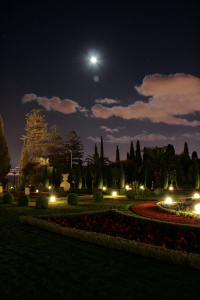
Photo: Nelson Ashberger
And here, we Baha’i pilgrims, assembled from throughout the world, lovers of all faiths, with personal roots in many different ones, were all gathered in the spot that honors one whose martyrdom, akin to Christ’s, aimed to help free mankind from its deepest bondage, and help it finally come home together.
As human beings grow, they lead the most spiritually actualized lives not when they cling to the small circle of family and what is familiar, but as they learn to embrace ever-widening circles and bonds with others. The pain in the world today seems directly proportionate to the degree to which we haven’t yet found the love for God and our fellow beings that will transcend our own limited knowledge and assumptions, that will make us eager to seek our Beloved, by whatever name we call Him, in every face.
The changeless faith of God, eternal in the past, eternal in the future, draws a circle meant to include each and every one.
Adapted from Life at First Sight: Finding the Divine in the Details –


February 5, 2014
The writing path of flexibility – and faith
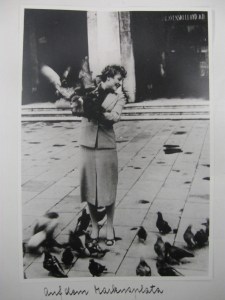 February’s the month in which two characters in the historical fiction I’m writing share a birthday. Like me, each has a strong cultural connection with Germany, where they meet in the years before World War II.
February’s the month in which two characters in the historical fiction I’m writing share a birthday. Like me, each has a strong cultural connection with Germany, where they meet in the years before World War II.
One of them, like my mother, is a Leap-year baby with that funky “29 Feb.” on her passport. That kind of thing can make you feel like a fictional character right out of the starting gate.
The other wants her life to resemble that of a character in a movie or novel, yet, as many women have, and do, she keeps giving it away to someone else just as fast as life sends her new opportunities.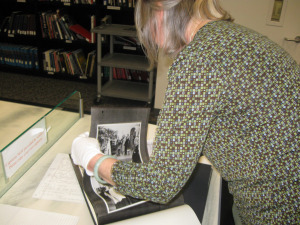
I have missed living with these women in their world. Things are about to get a lot more complicated there, because while these two are good friends, the men they love have highly antagonistic ambitions.
It’s an enormous grace to be able to do what I love. And, like many human endeavors, writing requires a curious balance of flexibility and – faithfulness. Having had two books — Snow Fence Road (fiction) and With Thine Own Eyes (nonfiction) — come out within six months of each other, I find it’s the faithfulness part (faithfulness to stay with the work of the writing) that is calling the loudest for me now, after some vigorously flexible months have kept me busy (mostly busy learning) in whole new ways.
 Recently, I noticed a kind of inner listing to one side of life’s spectrum that signaled the need for a course correction. I recognized my overlooked need to put the big stone of the writing time into the jar first, then add the rest of life’s activity around it.
Recently, I noticed a kind of inner listing to one side of life’s spectrum that signaled the need for a course correction. I recognized my overlooked need to put the big stone of the writing time into the jar first, then add the rest of life’s activity around it.
Writers write for so many different reasons. I write so that I can dive into that mysterious zone that I know will yield the deepest and most unexpected kind of discoveries. That is the only certainty that I have about it, that there will be such discovery.
The paradox is that while the very best part of it is the not-knowing, it is also, of course, the most terrifying part.
That’s where that marriage of flexibility and faithfulness comes in — or, on some days, of flexibility and faith.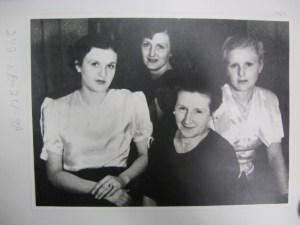
As I head back into the world of my two “February Fräuleins”, I’m marking this juncture with a giveaway-drawing for another jewelry prize because its vintage look evokes just what my characters might admire as they sit across a table from each other — what the more famous of the two, Eva Braun, might have worn in the photographs to which my research keeps returning.

Enter to win these vintage-design earrings from NH artist Diane Kirkup. Email: info@phyllisring.com with “vintage” in the subject line and your reply to the question: “What, as a reader, would you want to know about Eva Braun?” Contest ends Feb. 28.
The photo here on the left shows the February-birthstone prize, and shares information about how to enter.
This time, I’d love to gain thoughts and ideas from those of you who do, so I’ve given you a question to answer. The responses and thoughts you offer will help me a lot as I sit down again with pages and scenes and see where they want to lead.
I also ask, most respectfully and gratefully, for your good thoughts on my behalf.
And finally, as the calendar brings me closer to the end of this first year of the blog, I thank you for making time to stop in here and read, and for sharing the posts with others, as many of you do.




